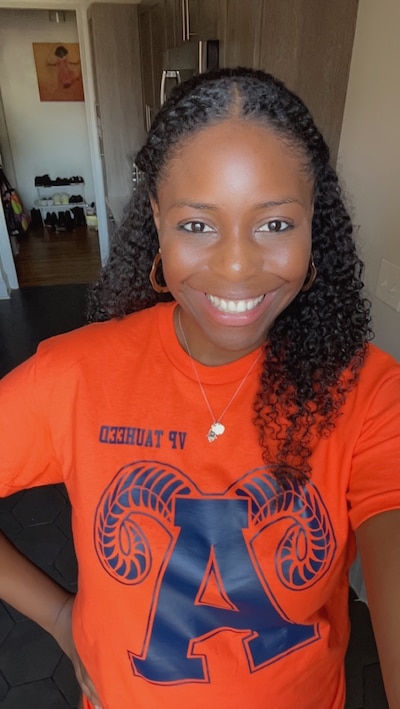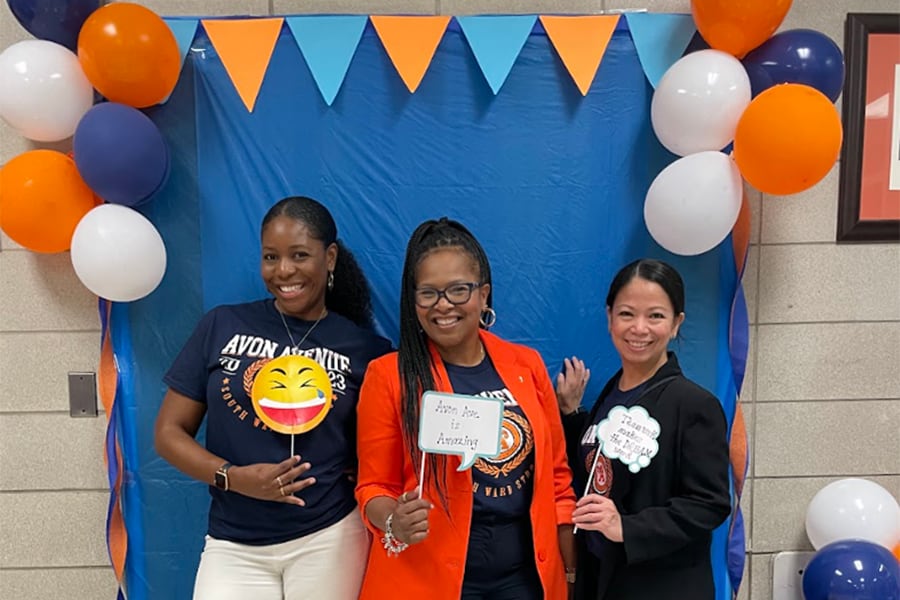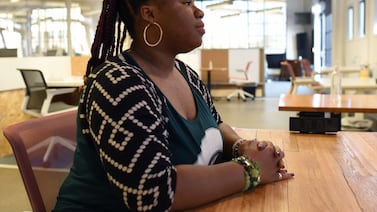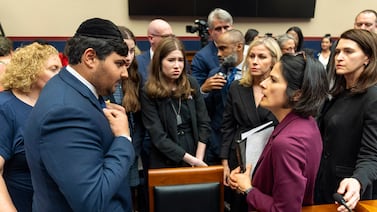Sign up for Chalkbeat Newark’s free newsletter to keep up with the city’s public school system.
Islah Tauheed’s return to Newark schools is a much-anticipated homecoming that carries on her family’s legacy.
The Newark native who recently became vice principal of Avon Avenue Elementary School comes from generations of educators and advocates for public education in the city. She started her career at the now-closed Miller Street School, where her grandmother went to school as a child. Her grandmother later became a school cafeteria worker and Tauheed’s mother spent 30 years as a special education teacher in the city.
As a school leader, Tauheed is now focused on creating a welcoming environment for new immigrant students and a joyful workplace for staff. She’s also prioritizing small group literacy instruction for K-3 classes.
When we last caught up with her, Tauheed was teaching English language arts at P.S. 567 Linden Tree Elementary School in the Bronx. After 12 years there, she returned to Newark last summer. “I thrived as an educator in New York City, but for every amazing thing I did, there was a voice in the back of my head that said, ‘I wish I was doing this for my own community,’” she said in a recent interview with Chalkbeat Newark.
In her new role, she works closely with Kinyetta Bird, a first-year principal at Avon Elementary. For Tauheed, this holds special meaning to be able to work alongside someone whom she identifies closely with, she says.
“Being a young Black woman leader and having her mentorship has been life-changing even in these short few months,” Tauheed said of Bird. “It changes your confidence to feel affirmed, validated, and understood. We speak often of how representation matters to students — but it matters to leaders as well.”
This interview has been lightly edited for length and clarity.
What issues have come up for you as a school leader this school year, and how have you addressed them?
This is my third year as a school leader, but my first as a school leader in Newark. One major event happening this year is an influx of newly immigrated students into our school. This is a demographic shift for this community which has historically been largely African American, African, and Caribbean. As a leadership team, we are prioritizing hiring more Spanish-speaking staff. Our climate and culture committee came up with a welcome plan for families to reduce feelings of isolation. We’ve also moved to a more inclusive model where our new students are supported by our ESL teachers beyond pull-out services. Our teachers are helping our new students within all content areas, including math.
Another less tangible effort this year is creating a culture of joyful persistence within our school. With all the demands in education, this job needs to feel sustainable. Our community has experienced a lot of loss due to COVID and instances of violence. It was a priority for us to balance giving grace to the staff, understanding that change is not easy, while also holding high expectations for academics. The wellness of both students and staff is promoted within our school. For example, my principal holds Wellness Wednesdays, during which our physical education teacher leads morning yoga for the staff. The care that the staff feels trickles down to the students.
How is your team helping younger students boost their reading levels and refine their literacy skills?
My young learners are busy! To support building and maintaining those foundational literacy skills, we implement daily small group work where there is a focus on phonics and phonemic awareness. Teaching early elementary school for 14 years, I’m aware that managing small groups is tough for a classroom teacher to do on their own, especially with the other daily demands.
I work very closely with my literacy coach, my academic interventionists, my resource teachers, and my amazing paraprofessionals to provide support for my classroom teachers. They push in during the literacy block and assist with small group instruction every single day. There are no fewer than three adults leading small group work daily in my kindergarten through third grade classes — it’s all hands on deck!
I say that teaching reading is rocket science and that all my teachers are action researchers. We spend lots of time progress monitoring and analyzing data so that we are responsive to student needs and adjusting instruction accordingly. We’ve been seeing movement, especially in the second grade, where 93% of the students have moved reading levels. It’s lots of work but it’s work of love, and I’m really proud and grateful to my team for passionately jumping on board.

How do you take care of yourself when you’re not at work?
This is an ongoing challenge as I’ve been trying to establish a work-life balance since I’ve entered education, but The Nap Ministry has been instrumental in me seeing rest as a revolution.
Part of my rest is seeking out spaces of comfort. I find being in nature really grounding, yet challenging when you live in an urban city. But even on my busiest days, I’ll drive to a park and sit by the river and feel the air on my skin.
I also love to cook, which many may find as more work! However, I enjoy putting meals together. Cooking is a creative outlet for me. I subscribe to NYT Cooking, and I try new recipes whenever I can. Lastly, everyone who knows me knows that I love to travel. Catch me on a plane!
Jessie Gómez is a reporter for Chalkbeat Newark, covering public education in the city. Contact Jessie at jgomez@chalkbeat.org.







